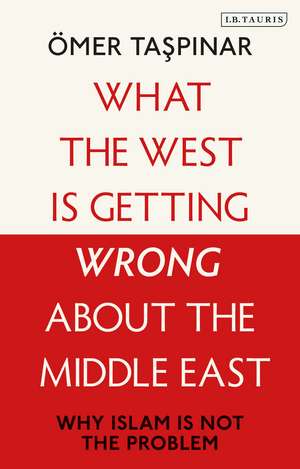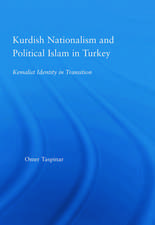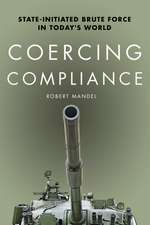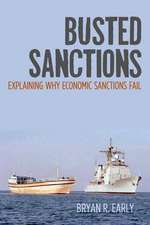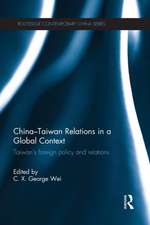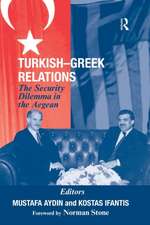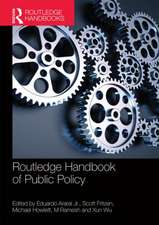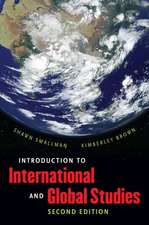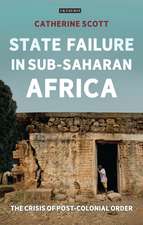What the West is Getting Wrong about the Middle East: Why Islam is Not the Problem
Autor Ömer Taspinaren Limba Engleză Hardback – 16 sep 2020
Preț: 174.18 lei
Preț vechi: 290.29 lei
-40% Nou
Puncte Express: 261
Preț estimativ în valută:
33.33€ • 35.64$ • 27.79£
33.33€ • 35.64$ • 27.79£
Carte disponibilă
Livrare economică 27 martie-10 aprilie
Livrare express 12-18 martie pentru 148.80 lei
Preluare comenzi: 021 569.72.76
Specificații
ISBN-13: 9781788310109
ISBN-10: 1788310101
Pagini: 280
Dimensiuni: 138 x 216 x 29 mm
Greutate: 0.45 kg
Editura: Bloomsbury Publishing
Colecția I.B.Tauris
Locul publicării:London, United Kingdom
ISBN-10: 1788310101
Pagini: 280
Dimensiuni: 138 x 216 x 29 mm
Greutate: 0.45 kg
Editura: Bloomsbury Publishing
Colecția I.B.Tauris
Locul publicării:London, United Kingdom
Caracteristici
Covers Turkey's transformation under Erdogan, the Sunni-Shi'a conflict in the Arab world, and the rise of the ISIS
Notă biografică
Ömer Taspinar is Professor of National Security Strategy at the National War College and a senior fellow at the Brookings Institution, both in Washington, DC. He is a regular commentator on Turkish, UK and US media and has written for a wide range of outlets, including Foreign Affairs, Washington Quarterly, Survival and Huffington Post (an article published last year for the latter was voted 'one of 15 articles that made us think differently about the world in 2015'). He often appears on BBC World News, Al-Jazeera and CNN, and - until its enforced closure - had a weekly column in Today's Zaman. He is also the author of Political Islam and Turkish Nationalism in Turkey and Winning Turkey, co-authored with Philip Gordon, Barack Obama's senior advisor for the Middle East.
Cuprins
Introduction: "Why don't we read the Koran?" Chapter 1: Overstating IslamChapter 2: TurkeyChapter 3: Sunnis versus Shiites Chapter 4: The Islamic State in Syria and Iraq Chapter 5: The Western Disconnect Chapter 6: What needs to be done?
Recenzii
To illustrate his contention that the role of Islam is often exaggerated [Ömer Taspinar] offers three diverse case studies: the modern history of Turkey, the sectarian conflict between Sunnis and Shiites, and ISIS. Each of the chapters on these three subjects is worth reading in its own right.
Prof. Taspinar has produced a worthy addition to what should be a growing body of work on the issue in question.
The Middle East remains at once a concern and an enigma for many in the West. Its problems have been readily blamed on Islam, all the more so as extremist groups have targeted Western interests. In this highly readable and well-argued book Omer Taspinar lays bare the fundamental truth about the Middle East, that its problems and threats have their origins not in religion but in politics. This book is an important corrective for policy-makers and all those interested in the Middle East.
This book shines a beacon of reason into the dark night of American ignorance about the Middle East. It methodically undermines the reflexive view that Islam is the inspirational source of upheaval there. By examining the development of Turkey, Iran, Saudi Arabia and groups like ISIS, Taspinar uncovers other forces that more decisively shape Middle Eastern politics.
This is quite simply the best book - and most accessible - on the topic. It is a "must read" for policymakers, scholars and students and an interested general public. Omer Taspinar's incisive analysis effectively critiques a conventional wisdom informed by Western foreign policies, identifying Islam and Islamic civilization as the primary driver in understanding developments in Turkey, the Sunni-Shiah conflict and ISIS, therefore overlooking their specific political, socioeconomic, and cultural contexts.
Certainly Islam played an important role in Middle East Politics, but it never superseded the other factors of "real politics" and has become a spent political force at the start of the 21st century. Debunking this "overislamization" of Middle East politics from concrete examples is one of the great achievements of Taspinar's book. May it be read!
While most scholars and pundits want to mystify the Middle East, wrapping it within religious and cultural enigmas that date back centuries and are of such profundity that western minds can never really grasp the intrigues, Taspinar wants to simplify. In this elegant and cogent tome, he argues that most politics and geopolitics there are in fact about power, money, pride, and survival-just like the ancient times in Greece that Thucydides described, indeed just like almost anywhere else in almost any other era. Taspinar is convincing when he writes about today's Middle East that 'Religion is part of the political equation, but more as a driver and instigator rather than the real source of conflicts.'
Prof. Taspinar has produced a worthy addition to what should be a growing body of work on the issue in question.
The Middle East remains at once a concern and an enigma for many in the West. Its problems have been readily blamed on Islam, all the more so as extremist groups have targeted Western interests. In this highly readable and well-argued book Omer Taspinar lays bare the fundamental truth about the Middle East, that its problems and threats have their origins not in religion but in politics. This book is an important corrective for policy-makers and all those interested in the Middle East.
This book shines a beacon of reason into the dark night of American ignorance about the Middle East. It methodically undermines the reflexive view that Islam is the inspirational source of upheaval there. By examining the development of Turkey, Iran, Saudi Arabia and groups like ISIS, Taspinar uncovers other forces that more decisively shape Middle Eastern politics.
This is quite simply the best book - and most accessible - on the topic. It is a "must read" for policymakers, scholars and students and an interested general public. Omer Taspinar's incisive analysis effectively critiques a conventional wisdom informed by Western foreign policies, identifying Islam and Islamic civilization as the primary driver in understanding developments in Turkey, the Sunni-Shiah conflict and ISIS, therefore overlooking their specific political, socioeconomic, and cultural contexts.
Certainly Islam played an important role in Middle East Politics, but it never superseded the other factors of "real politics" and has become a spent political force at the start of the 21st century. Debunking this "overislamization" of Middle East politics from concrete examples is one of the great achievements of Taspinar's book. May it be read!
While most scholars and pundits want to mystify the Middle East, wrapping it within religious and cultural enigmas that date back centuries and are of such profundity that western minds can never really grasp the intrigues, Taspinar wants to simplify. In this elegant and cogent tome, he argues that most politics and geopolitics there are in fact about power, money, pride, and survival-just like the ancient times in Greece that Thucydides described, indeed just like almost anywhere else in almost any other era. Taspinar is convincing when he writes about today's Middle East that 'Religion is part of the political equation, but more as a driver and instigator rather than the real source of conflicts.'
